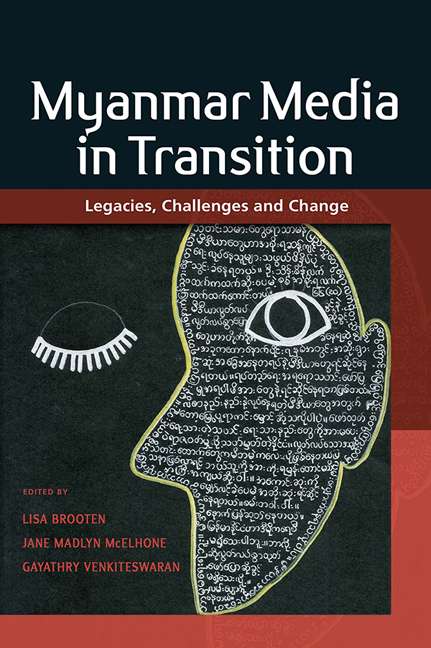Book contents
- Frontmatter
- Contents
- Contributors and Editors
- Burma or Myanmar? A Note on Terminology
- 1 Introduction: Myanmar Media Historically and the Challenges of Transition
- Part I Structural Constraints and Opportunities
- 2 Legal Changes for Media and Expression: New Reforms, Old Controls
- 3 Whispered Support: Two Decades of International Aid for Independent Journalism and Free Expression
- 4 The Changing Face of Print Media: An Interview with News Veteran Thiha Saw
- 5 Privacy Risks in Myanmar's Emerging ICT Sector
- Part II Journalism in Transition
- Part III Creative Expression
- Part IV Society and Media
- Epilogue: Media Studies in Myanmar – Where Do We Go from Here?
- Index
3 - Whispered Support: Two Decades of International Aid for Independent Journalism and Free Expression
from Part I - Structural Constraints and Opportunities
Published online by Cambridge University Press: 07 September 2019
- Frontmatter
- Contents
- Contributors and Editors
- Burma or Myanmar? A Note on Terminology
- 1 Introduction: Myanmar Media Historically and the Challenges of Transition
- Part I Structural Constraints and Opportunities
- 2 Legal Changes for Media and Expression: New Reforms, Old Controls
- 3 Whispered Support: Two Decades of International Aid for Independent Journalism and Free Expression
- 4 The Changing Face of Print Media: An Interview with News Veteran Thiha Saw
- 5 Privacy Risks in Myanmar's Emerging ICT Sector
- Part II Journalism in Transition
- Part III Creative Expression
- Part IV Society and Media
- Epilogue: Media Studies in Myanmar – Where Do We Go from Here?
- Index
Summary
In March 2012, at Myanmar's first national media development conference at the Chatrium Hotel in Yangon, Yangon Journalism School's founding director and lead trainer Ye Naing Moe asked which editors and journalists had been trained by the Indochina Media Memorial Fund (IMMF) during the long years of the military junta. I looked around as a sea of hands filled the room. It was the first time the IMMF's cross-border and underground training had been acknowledged in public, and the first time Burmese editors and journalists publicly admitted they had been trained.
These reflections by Jane Madlyn McElhone begin to clarify the inextricable connection between the two decades of international aid during the military junta and the struggle to protect and increase the space for free expression and free media inside the country since the political opening. Although plans for top-down, government-led media reforms began shortly after a purge of military intelligence in 2004 (Kean 2018), media development efforts in, and for, the country have a much longer history. Empowered by decades of aid support — in the form of educational opportunities, training, and funding — editors, journalists, writers and free expression advocates from inside the country, the borderlands, and exile have seized the unprecedented opportunities presented by the political opening. They are pushing the boundaries of independent journalism, advocating and fighting for free expression and free media, and playing leadership roles, including mentoring what Ye Naing Moe affectionately calls “our new generation of watchdogs” (Interview 30; see appendix). They say these historic aid opportunities have provided an important impetus for change, and that they have helped them navigate the new media development narrative which some aid recipients, including some contributors to this book, argue too often prioritizes state media development and foreign policy agendas above local ownership and decision-making, public service, diversity and access for all. As they have always done, these media practitioners are working within, and pushing against, the constraints of the shifting space allowed for free media and free expression established by the government, the military and their cronies.
Against the comparative backdrop of international media development, we examine the dynamics that drove this historic support in Burma.
- Type
- Chapter
- Information
- Myanmar Media in TransitionLegacies, Challenges and Change, pp. 95 - 130Publisher: ISEAS–Yusof Ishak InstitutePrint publication year: 2019



